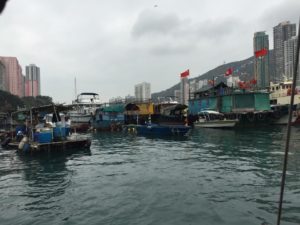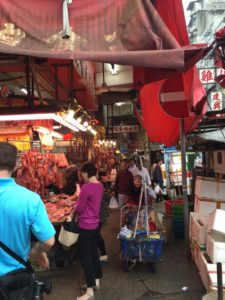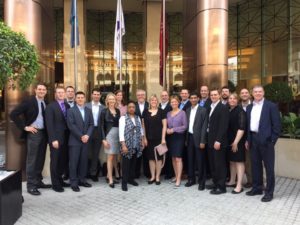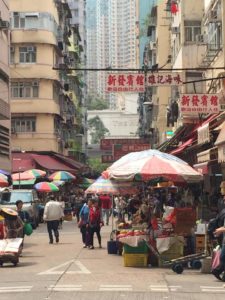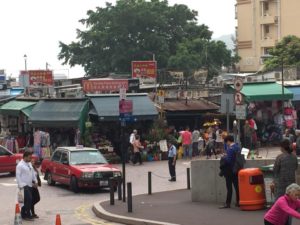In March 2015, a cohort of Executive UST MBA students arrived at a textiles manufacturing plant in Ho Chi Minh City to observe how clothing was made. The group was taking part in an international residency, part of their Global Systems class, that included Hong Kong and Vietnam. They soon discovered that they would be observing the manufacture of jackets for the American outdoor products retailer The North Face; ironic, given that much of the company’s signature outerwear is better suited to cold climates such as Minnesota rather than the subtropics. But clothing manufacture remains, for now, a major industry in Vietnam. The students were able to take an extensive tour, stopping to observe each step along the way as raw materials were transformed into finished jackets. “We were able to see a garment made from beginning to end,” said Jessica Kluntz, program manager for the Executive UST MBA program, who helped to organize and facilitate the trip. “Workers were making and cutting the patterns in one room, putting in zippers in another and embroidering the logo in another,” she said. “We saw a jacket made from the beginning to when they boxed it and put it on a semi.”
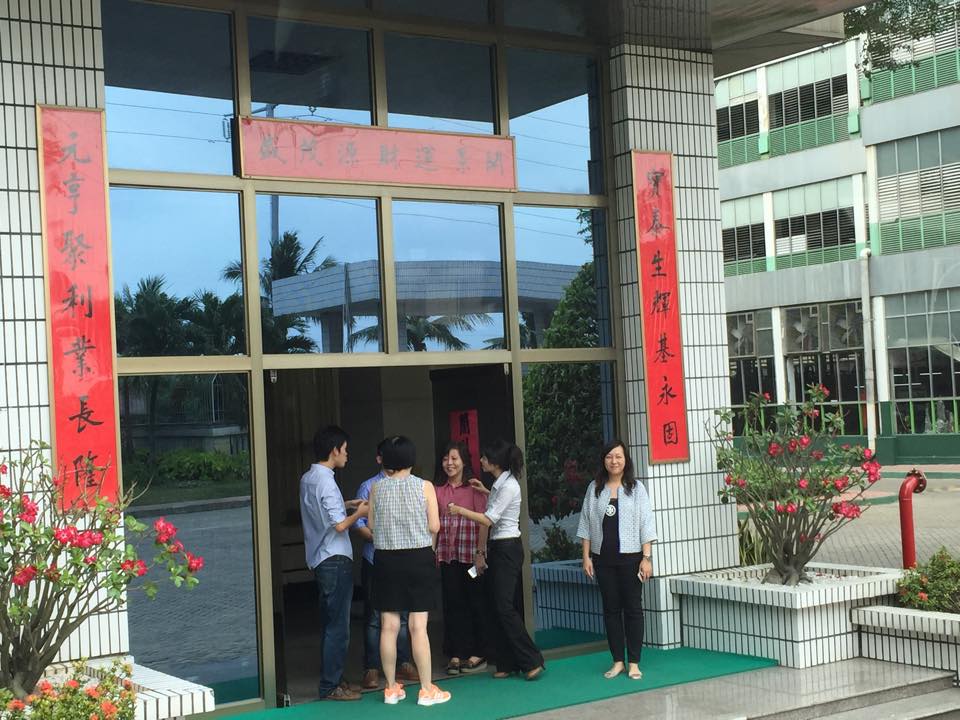
Staff at VF, manufacturers of The North Face.
The factory turned out to be not at all what the group was expecting. It was a place more advanced in terms of technology, cleanliness and labor practices than anticipated, while at the same time the work performed there harkened back to the sort of hands-on processes one might have assumed were a thing of the past. “It was eye-opening to see how manual the process still is,” said Jeff Wright ’16 M.B.A. As a regional community marketing manager for Dick’s Sporting Goods, Wright has considerable experience in retail, but he quickly realized how little he understood about what goes into making clothing. “I would have anticipated that textile manufacturing was much more automated,” he said. “The factory had far more skilled labor and far better working conditions than I anticipated.” Joanna Hjelmeland, ’16 M.B.A., a senior manager of communications and marketing for CenturyLink, agreed, saying that the experience made the existence of an incredible supply chain behind every piece of merchandise, something she knew about in theory, that much more real. “I’ll never pick up another North Face jacket without looking to see where it was made,” she said. “I’ll think about all the careful hands that helped create each piece of defense against the Minnesota winter.”
Business Insights
This kind of experience was just what faculty aimed for when devising and planning the residency, in which students travel first to a country with an established economy and then another with an economy that is just emerging, and make site visits throughout. Companies visited during this residency included Edelman Public Relations Worldwide, Roche Pharmaceuticals, Mead Johnson Nutrition and St. John Logistics, among others. “We’re putting an increased emphasis on getting graduate students connected to international learning opportunities,” Peter Young, Ph.D., professor of management who teaches Global Systems and led the trip, explained. “The residency in Hong Kong and Vietnam is a good example of this. Despite only having 10 working days in these two locations, we were able to organize a trip that provided students with a range of cultural experiences and insights into international business.”
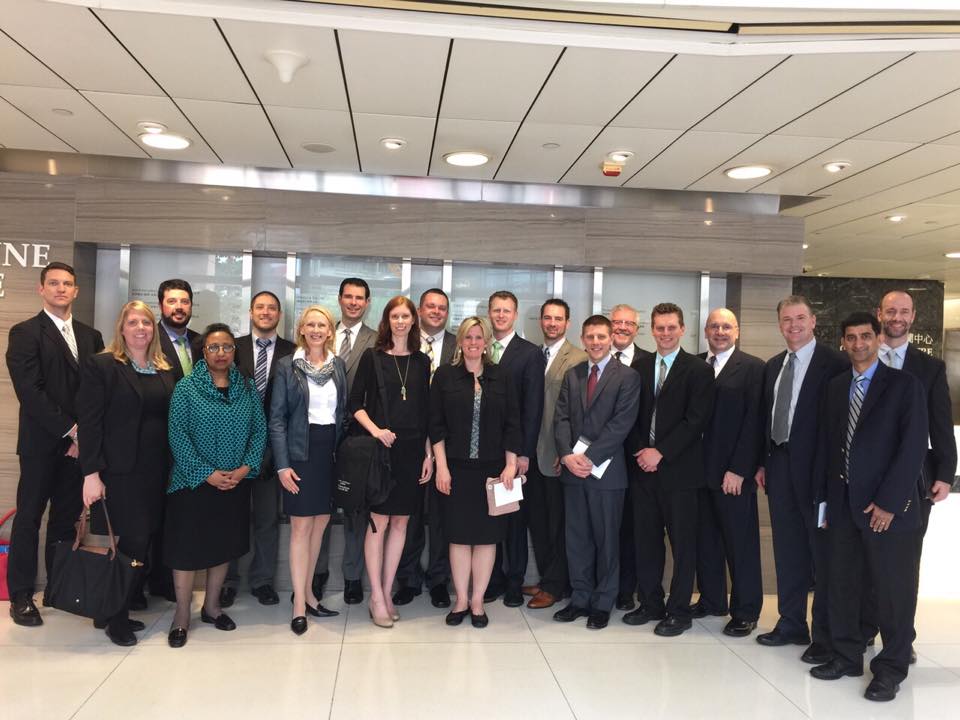
Visiting Roche Pharmaceuticals.
Overarching themes quickly emerged in each country. In Hong Kong, it was the China effect. “One big takeaway was that, because China is such a big influence, we have to learn how to collaborate and work together,” Kluntz said. Young agreed, saying, “China represents a huge market and it’s an influential player in our global economic system. Our students were able to get some very interesting insights into doing business there.” Several spokespeople for businesses and corporations operating in Hong Kong mentioned their concern about China’s plans for Hong Kong going forward. “The biggest thing that crystalized for me is the power of China and how much control they have,” Wright said. “In the U.S., we hear a lot about China and its size, but every leader we spoke with talked about the power of China and how calculated they are in what they are doing. Leaders in Hong Kong are especially concerned about the future and how much control is China going take over a democratic Hong Kong. One country, two systems….The question becomes whether or not this can last.”
“In the U.S., we hear a lot about China and its size, but every leader we spoke with talked about the power of China and how calculated they are in what they are doing. Leaders in Hong Kong are especially concerned about the future and how much control is China going take over a democratic Hong Kong. One country, two systems….The question becomes whether or not this can last.”
— Jeff Wright ’16 M.B.A.
In contrast, the cohort discovered a very different environment in Vietnam, one of boundless energy and a palpable sense of optimism. “Vietnam surprised all of us,” Young said. “I certainly was not prepared for the dynamism and youthful élan we encountered. Ho Chi Minh City is humming with energy. Beyond insights into business, we encountered a very beautiful country that is, of course, living with very serious legacy challenges, but seems poised to continue on its rapid rate of growth.”
Touring factories and businesses in Vietnam changed how some students viewed Western corporations that off-shore or outsource labor to developing countries. “There are obvious economic reasons companies do this,” Wright said. “However, I was one coming into this trip with a negative perception of it. But after seeing the factories and how things are made, a ‘Made in Vietnam’ tag will not be a negative for me. If anything, I will think about the workers of Vietnam and how much respect I have for them.” However, this sort of manufacturing work is not something people can count on; these kinds of jobs continue to migrate around the globe when production costs rise, even in countries once considered to be strictly part of the Third World. The group observed that in Vietnam, as in Hong Kong, there is a rising middle class and increasing government regulations that will eventually push many manufacturing jobs out of Vietnam into countries such as Bangladesh and Myanmar.
Overall, the group found that government plays a more critical role in business in the two countries than it does in the U.S. “Here, we use policy and strategic communications to accomplish business goals,” Hjelmeland said. “But globally, governments have a more direct impact on businesses, from how they advertise to what their profit margins can be. For example, we learned that Mead Johnson, a pharmaceutical company in Hong Kong, was asked by the government to reduce its prices for baby formula. Business is expected to help raise critical social issues as well.” In Vietnam, Kluntz said, the government is becoming increasingly involved in protecting the environment from manufacturing waste and pollution. “Vietnam is changing and evolving so much that now the government is holding companies to standards not seen before. The climate for manufacturing is changing. Companies can’t overwork employees and are required to provide clean, safe environments. The workers we observed worked from 7:30 a.m. to 4:30 p.m. with an hour for lunch – it was not what we were expecting.”
A Culture of Innovation
However, even with more government oversight, companies are finding ways to innovate. One company that stood out for Young and for students in this capacity was Schneider Electric, a French firm that relocated its global headquarters to Hong Kong to be better positioned to respond to the growth taking place in Asia. “This firm has really put its money on a very new and different future,” Young said.
Hjelmeland, with her perspective as a manager in a technology-focused utility, was particularly intrigued by the sustainability practices put into place by Schneider, which invested in internal start-ups during the recent economic downturn. “I’ve observed other companies in downturns just tighten up and play the short game,” Hjelmeland said. “So I found their culture of innovation refreshing. I know how challenging it can be to serve all customers, especially those in very rural areas. At one point, the company spokesperson showed us a solar-powered unit they’re using to serve developing countries. It stores power, can be used at night as a light source and has a USB to connect a mobile device. It serves basic needs of power and light and also the demand in emerging markets for mobile device power access– all in one unit. I left this visit feeling inspired and with a renewed interest in sustainability work.”
Along with learning about the complexities of global business, another goal of the trip was to facilitate meetings between students and expatriates already living and working in these countries. “We want students to meet expats in order to learn about their experiences,” Kluntz noted, “both on a professional and a personal level. The students in the Executive MBA program often have the option through their current companies to work internationally, so it's very helpful to them to get the perspective of someone who’s already doing it. They were able to ask a lot of questions, some of which were business related and some that were more along the lines of, 'How do you get your kids into school?'”
Not all expats the cohort met saw their roles in the same way. “The American expats we spoke with saw themselves as essentially being on assignment for a few years,” Wright explains. “Their main goal was to get back to America. Expats from other countries saw themselves more as international citizens who didn't necessarily feel the need to get back to their native countries. While they weren't opposed to going back home, they didn’t relate to their country in the same way as Americans did.”
The opportunity to speak with expats gave some students a better understanding of whether or not they were qualified for an international position. “I’ve always thought that at some point in my career, I’d like to take a global assignment,” Hjelmeland said. “Before this trip, I wondered if my background in strategic communications wasn’t the right path to an executive-level role overseas. I thought I might need to change direction to human resources or operations if I wanted to have a global position as a possibility.” But she said she was pleasantly surprised to hear the convergence of strategic communications, public policy and stakeholder engagement called out as the foundation upon which successful global business leaders often succeed. “It affirmed for me that my experiences and professional path have positioned me for an opportunity to lead globally,” she said.
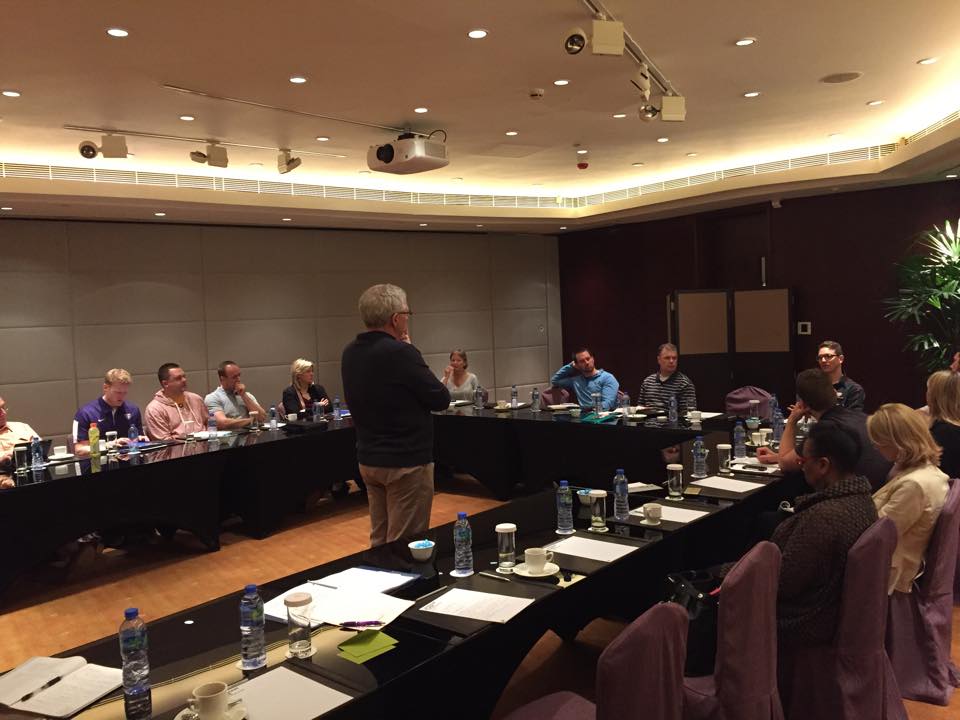
Professor Young conducting class in Hong Kong.
Young explained that, even if the students ultimately decide against working abroad, the residency will have lasting impact. “Travel changes your perspective forever, especially international travel,” he said. “No matter how intensive the program of study, the simple fact is that our students are exposed to a different perspective on life. I believe this challenges their assumptions and prejudices. How these changes manifest themselves is quite varied; one person might be motivated to change career plans or personal goals, but more likely it will occur in subtle ways, like stopping to consider other perspectives before making a decision, following international news more closely, or the books one chooses to read. You simply are not the same person you were before you departed.”

